Understanding Equipment Functionality
Operating and maintaining automation equipment requires a fundamental understanding of its functionality. This includes knowing how the equipment operates, its components, and the purpose of each component. Familiarize yourself with the equipment's user manual, technical specifications, and operating procedures to gain a solid foundation.
Automation equipment often relies on programming and software to function optimally. Basic programming skills, such as understanding logic and programming concepts, are beneficial for operating and troubleshooting automation systems. Familiarity with specific programming languages, such as ladder logic or Structured Text, may be necessary for advanced customization or troubleshooting.
Automation equipment comprises electrical and mechanical components. Having a good understanding of electrical systems, including circuits, wiring, and sensors, is crucial for operating and maintaining the equipment safely. Similarly, a solid mechanical aptitude is essential for tasks like equipment assembly, disassembly, and troubleshooting mechanical issues.
Operating and maintaining automation equipment often involves addressing technical issues or malfunctions. Possessing troubleshooting skills and a problem-solving mindset is invaluable. This includes the ability to identify the root cause of a problem, analyze symptoms, and implement effective solutions. Troubleshooting often requires a systematic approach, logical reasoning, and attention to detail.
The field of automation is ever-evolving, with advancements and updates occurring regularly. To effectively operate and maintain automation equipment, it is crucial to have a mindset of continuous learning and adaptability. Stay updated with industry trends, attend training programs or workshops, and engage in professional development activities to keep your knowledge and skills relevant.
Operating and maintaining automation equipment often involves collaboration with cross-functional teams, such as engineers, technicians, or supervisors. Effective communication skills are necessary to convey information, report issues, and collaborate on resolving problems. The ability to work well in a team environment, exchange ideas, and share knowledge enhances overall operational efficiency.
Adhering to Safety Procedures
Safety is paramount when working with automation equipment. Understand and strictly adhere to safety protocols, lockout/tagout procedures, and guidelines specific to the equipment. Regularly review safety measures and stay updated with the latest industry standards to ensure the well-being of yourself and others.
Operating and maintaining automation equipment requires a certain level of technical expertise encompassing equipment functionality, programming knowledge, electrical and mechanical aptitude, troubleshooting skills, continuous learning, collaboration, and adherence to safety procedures. By recognizing the skill sets necessary, businesses can assess their workforce and provide appropriate training and resources to support the effective operation and maintenance of automation equipment. Remember, technical expertise is an ongoing journey, and investing in the development of skills ensures the smooth functioning of automation systems and maximizes the benefits they bring to businesses.







No comments:
Post a Comment